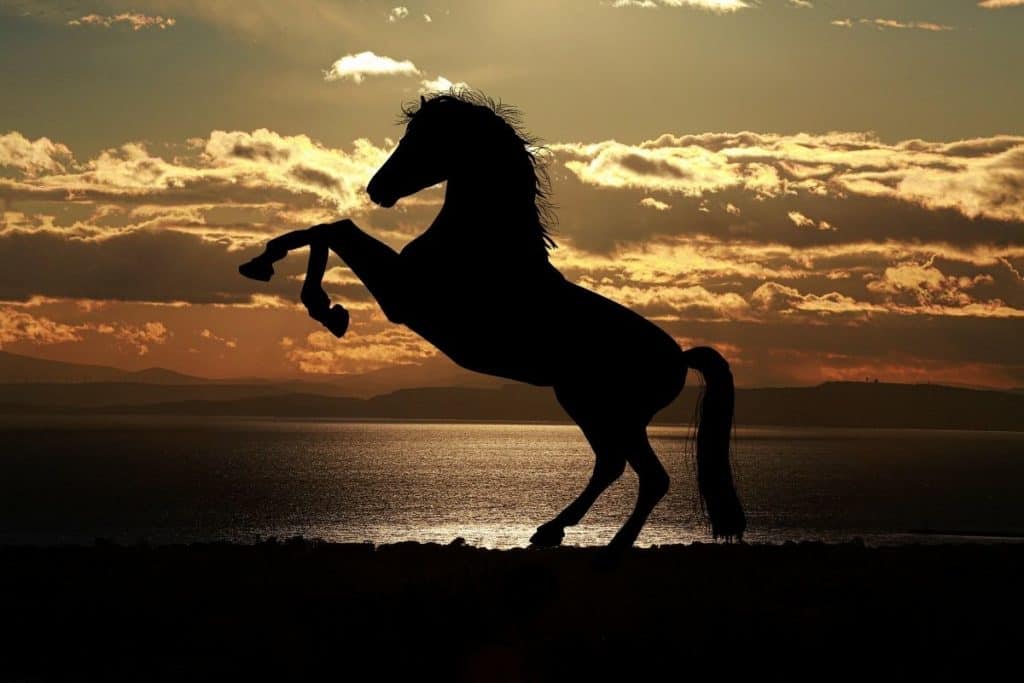For a relatively large animal, horses can be a jumpy animal that seems to get scared by anything. Even experienced riders can be caught off guard when a typically calm horse gets spooked by something.
But the question becomes why horses can be so skittish and if there’s anything you can do to keep them from getting jumpy and possibly injuring you in the process?
Horses are skittish as a natural defense mechanism. When horses see something that scares them, they have a quick reaction so that in the wild, they could quickly flee a predator or danger to them. Horses also jump when they’re in physical pain or discomfort (i.e. if their saddle is too tight).
Riding a horse can be a great experience, and many people enjoy doing so regularly without issues. As horses get older and more experienced, they often aren’t as skittish.
However, even the oldest and calmest horse can spook at some point, and it’ll probably happen. This article describes some of the common reasons for a skittish horse.
Why Are Horses so Skittish?
Simply put, horses are skittish because of the “fight or flight” response so ingrained in all living organisms. When a horse doesn’t understand something it sees, hears, or smells, it will often jump away from the stimulus, which allows the horse to make a quick escape.
Horses also jump if they’re in physical discomforts, like a horse whose saddle is uncomfortable or has back issues, or they may be jumpy simply because they have a lot of energy and need to burn it off.
These horses will seemingly spook at nothing.
Anything can cause a horse to spook (in which the horse jumps to the side or rapidly changes its current direction of travel with the intent to run away), but some of the most common reasons for spooking include:
- Your horse sees, hears, or smells something that scares it
- Your horse feels nervous before certain cues from its rider
- Your horse feels uncomfortable or is in pain
- Your horse has a lot of energy and just jumps
We’ll cover each of these reasons in more detail below, as well as what riders can potentially do to help keep their horse from spooking or what they can do to handle a skittish horse.
Why Your Previously Calm Horse Has Been Spooking
It can be very discouraging when a horse you’ve built a relationship with and has been relatively calm suddenly starts spooking at the drop of a hat. While there are several reasons a horse may start spooking, you should first rule out medical issues.
You may need to look at your own behavior and make sure you haven’t started acting nervous around your horse, for whatever reason.
You may also need to work with a professional to help your horse get used to the things it seems to be afraid of, whether that’s water, tractors, or any other seemingly random item.
Common Reasons Horses Spook

As mentioned above, there are four common reasons that horses spook or are skittish. These aren’t all-inclusive and there are of course other reasons your horse may spook, but these are four of the most common reasons for horses spooking and jumping.
External Stimuli
As a prey animal, your horse is pre-inclined to jump away from anything it finds dangerous. This may include a snake it comes across on the ground, or the smell of a bear or wolf it catches while you’re riding it through a trail in the forest. Of course, a sudden noise or a bird fluttering out of the bushes nearby may also spook your horse.
Rider Cues
Your horse also may learn to be skittish because of cues from you or common tasks you have the horse perform. For instance, your horse may become skittish when it approaches the same obstacle while you’re riding it, which is an indication that it has had bad experiences with that obstacle in the past.
Horses can read their rider’s body language pretty well, and a rider who tenses up because they come to a spot where their horse has spooked in the past will then give their horse a cue to spook again, and the cycle spirals from there.
Sometimes, leading your horse by the reins to show it that all is well is the best bet for breaking it off its jumpy behavior.
Physical Discomfort
Horses may also get jumpy and skittish because it’s in physical discomfort or pain. If the saddle its wearing is too hard or uncomfortable, or if it has a bad shoe, or if the horse has an injury to its back or spine, it may jump.
This isn’t surprising, and if your horse seems to jump at seemingly nothing, you may need to get it checked by a vet to make sure it’s in good health.
Burning Off Energy
Some horses and breeds are just naturally jumpier because they have more energy. Horses are big animals that can run for long periods, so you’d have to imagine they have a lot of pent up energy. Sometimes, they just need to burn off some of that energy by jumping around. You may confuse this with spooking, but it may or may not be tied to that.
This can make it more difficult to determine why your horse is being skittish, but making sure it gets plenty of exercise is a way to help it burn off stored energy and keep it from being too jumpy.
Warning Signs That Your Horse Is Going to Spook
Luckily, horses give off some very clear signals that they’re frightened and may jump soon. Just some of these signals include:
- Shakes or trembles
- Ears stand up and snap forward
- Rolling their eyes
- Picks head up
- Pacing in their stall
If your horse starts displaying these symptoms, you should be worried that it will spook if you ride it. Before you ride it, you should take some steps to calm your horse down so it doesn’t jump while you’re on its back.
How to Handle a Skittish Horse
If your horse is naturally skittish, don’t give up hope. There are still things you can do as a rider to help your horse calm down and stop being so jumpy and nervous. First, recognize that there’s a reason that your horse is spooking, and be patient and as calm as you can with your horse.
Impatience or losing your cool gives your horse a reason to react, and it can quickly lead to a negative feedback loop where you and your horse are just making each other more nervous and jumpy. That’s not good at all.
If your horse is jumpy, try getting out of the saddle and speaking calmly to your horse, and leading it by the reins for a while. If it sees you go first, it may be more likely to do whatever you need it to do.
You should also make sure your horse doesn’t have medical issues by getting it checked out by a good veterinarian. If your horse is suffering from back issues, or it’s having dental problems, it may jump from the pain its experiencing. Check things like its bit, its saddle, or its girth, but if you rule those items out, you should call in an expert.
Closing Thoughts
A horse and its rider can have an incredible relationship, and that companionship can be fruitful for years. However, if your horse is spooking, don’t give up. You can help your skittish horse overcome its fear and nervous jitters and get back in the saddle.
